How May used Mixpanel to drive product improvements and successful startup fundraising
Company
May is a mobile application healthtech startup from Paris, founded in 2020 by Antoine and Cécilia Creuzet, a couple of young parents. Their mission is to empower future and young parents so that they can have a peaceful and enlightened parenting journey. May provides exclusive and professional content as well as access to a medical chat with pediatricians, midwives and pediatric nurses. These May health professionals accompany you on a daily basis in the incredible adventure of pregnancy. Since its launch, the May app (available on IOS and Android) has already won the hearts of more than 100,000 parents and aims to become the reference application for parents in Europe.
Goals
As a startup tasked with raising funds, May needed an analytics tool to better understand their business and their KPIs to enable a successful fundraising process. They also needed an analytics tool to derive insights on their users to make more informed decisions on their product and content roadmaps.
Solution
In 2021, May onboarded Mixpanel to provide important data insights to share in conversations with potential investors and to continue to grow their business. By using Mixpanel, they were able to gain trust of investors through accurate and easily accessible data, as well as curate better content and enhance product features to enable the growth of their user base and their overall business.
Results
- Doubled their retention rate of users using Mixpanel data insights
- Two-digit growth per month of users
Mixpanel is an absolutely critical tool to understand what our users want, and therefore, what we should do to deliver on their needs.Antoine Creuzet Co-founder, May
How they did it
Why were you seeking an analytics tool?
There were two main reasons why we decided we needed to use an analytics tool:
- We needed to understand our business and our KPIs (daily/weekly/monthly active users, retention, conversion, etc). This info was critical to be efficient with our fundraising process as a startup.
- We needed to understand the way our users use the product and what they are doing in the product, in order to make more informed decisions about our product roadmap and our content production roadmap.
How did you learn about Mixpanel?
We were using Firebase before, and it was a poor experience. We were looking for a better tool so we conducted research on the web. We were not using analytics tools for mobile apps at the time. We asked friends in the industry who shared that Mixpanel was one of the best tools. We met Mixpanel for a demo and discovered Mixpanel was exactly what we were looking for. And with the peer recommendations, it was a no-brainer.
Why did you choose Mixpanel?
We felt the team at Mixpanel really understood what we were looking for and could deliver it. They were able to show us the exact use cases we talked about during our first demo. Not only were they able to show all the features of the product and the complete end-to-end solution that we were seeking, but they also were able to demonstrate that they could serve startup customers. We were able to sample the product to confirm it wasn’t too mainstream for our startup use case.
Tell us how you’ve used Mixpanel to assist with your process of raising funds.
We’ve used Mixpanel to access data on numbers of active users, key ratios, etc. Everything the fans and the Venture Capitals (VCs) ask for in a meeting. It’s so important that not only do you know the KPIs for your own knowledge, but it’s critical in a VC meeting to have that data available and at your fingertips. You need to demonstrate that you can provide those analytics very fast and that you know your business. If you don’t know the key figures, it’s very tough to negotiate.
An important win for us using Mixpanel: Mixpanel respects the GDPR, and it’s very apparent. This is important when you’re in the process of raising funds and encountering things like audits. It was very easy for us to see that Mixpanel owns our data in the European Union and to provide this information to the investors. With other analytics tools, it’s very tough to see where your data is stored. With Mixpanel, it’s very obvious and easy. We greatly appreciate that.

You mentioned using Mixpanel has allowed you to gain credibility. Can you please elaborate on that?
It helps us when we can concretely provide the data, and most importantly, it helps us to feel confident. Before a meeting, during a meeting, in that challenging process, the fact that we know that we have all the data that we need easily brings us a lot of confidence. For us, that’s a game changer.
How else do you use Mixpanel?
Internal use cases:
- As a team of founders, we use the Mixpanel dashboard to get a good overview of our business. We use it for our product roadmap decision-making process. When we’re discussing developing a new feature, we look at the data in Mixpanel to make an informed decision. Once we have rolled out the new feature, we follow the results on Mixpanel so we can determine if we should make modifications or stay the course.
- We publish a lot of different content, ranging from articles to audio master classes, and we tag every content with the child’s age for that relevant topic. The tagging plan is important– you need to tag content properly in order to get the data insights. Then on a weekly basis, the content team looks at which category and which age range appear to be working best. They use this data to adapt their content production strategy. For example, we launched a master class and with Mixpanel we can check performance metrics in the first 14 days after launch. If the content appears to be resonating, we will put more focus on producing content on that topic. Right now, our most popular topic is sleep!

External use cases:
- We share reports with our partners so they can access the data all the time.
- We use it to monitor user acquisition and to exchange that data with our external agency. Using dashboards to share with our user acquisition agency, an external agency who partners with us on Facebook ads, has been very beneficial.
What is something cool you’ve discovered through Mixpanel data?
Using Mixpanel, we discovered a specific type of content format was very popular and linked to higher retention of users. We decided to produce more of that content format to improve our retention data and the usage of our product. We speak with our users often for feedback, but without Mixpanel, we would not have discovered this finding which was glaringly obvious when we looked at the report. As a result, we were able to double our retention rate. We’ve also seen two digit growth per month in users.

How does Mixpanel work with other integrations and internal tools?
At the moment, we use Segment as a data source, so Mixpanel is integrated with Segment to get all the data. That integration works perfectly and has been amazing. It’s so easy to use once it’s integrated; it’s one click. The benefits are speed, data accuracy, and trust. We also use Customer.io for our CRM, and we plan to integrate Mixpanel with it to get data about our CRM campaigns.
What are you excited about with Mixpanel’s new features and products?
We had the opportunity to test Signal for free. It was very nice to use it for a week; we loved it.
What advice do you have for someone evaluating a new analytics tool?
Select a tool that is deep enough to enable you to access proper analytics but easy to use to allow you to be able to use it on your own. If the tool is very deep but very complicated, and you need to hire a consultant to set it up and to assist with deriving the data insights, then it’s completely useless because you’re unable to use it self-sufficiently. You want an intuitive tool with an easy user interface.
We speak with our users often for feedback, but without Mixpanel, we would not have discovered this content finding which was glaringly obvious when we looked at the report. As a result, we were able to double our retention rate.Antoine Creuze Co-founder, May
Product teams just like yours are using Mixpanel to build better products. Sign up for a free account today and see for yourself.

